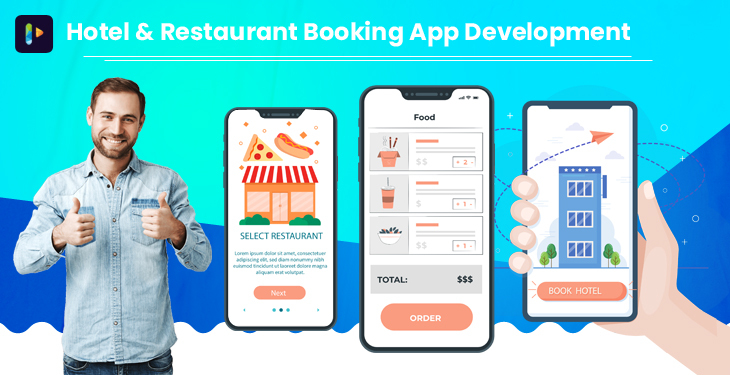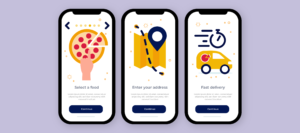Today, digital transformation is helping companies interact with their customers more seamlessly. The travel and dining industry is booming at its best and is one of the popular categories in app development. A complete solution available right on smartphones adds more value to its growth. So, if you’re a hotelier/ restaurateur planning to digitize your business, you need to cover various aspects to make it stand out. In this guide on hotel and restaurant booking app development, you will learn how this app can be beneficial to you and how to develop one.
What is a Hotel and Restaurant Booking App?
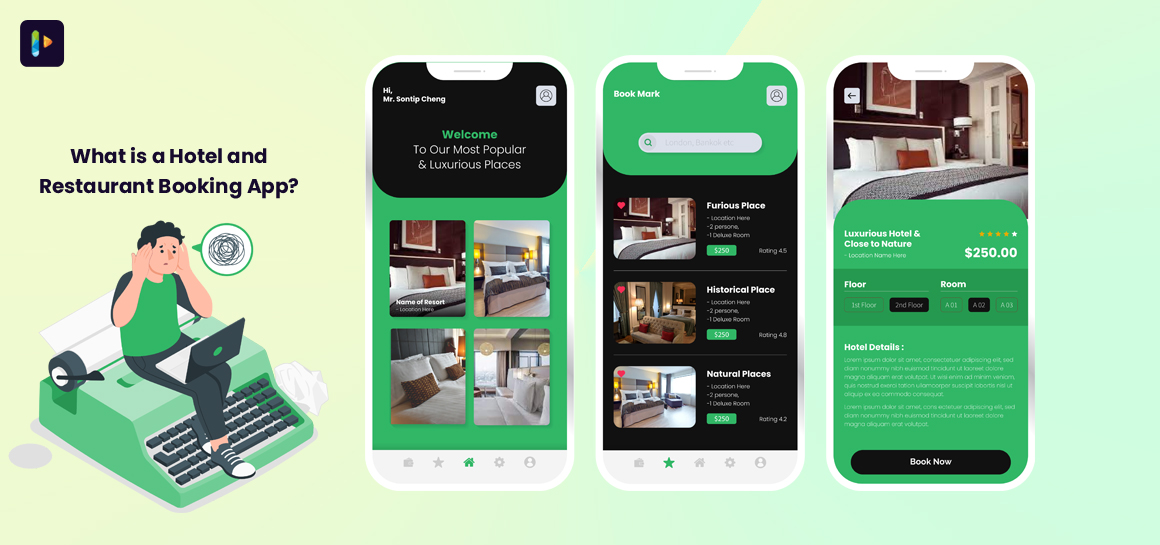
A hotel and restaurant booking app refers to a digital platform that allows hoteliers/ restaurateurs to manage bookings online. It lets users view all hotel and restaurant options with a few scrolls. Users can simply select the place based on filters such as location, amenities, price range, and check-in & check-out times. The app also allows users to select a place based on elaborate descriptions and photographs.
Why Is Hotel and Restaurant Booking Development Important for Business Growth?
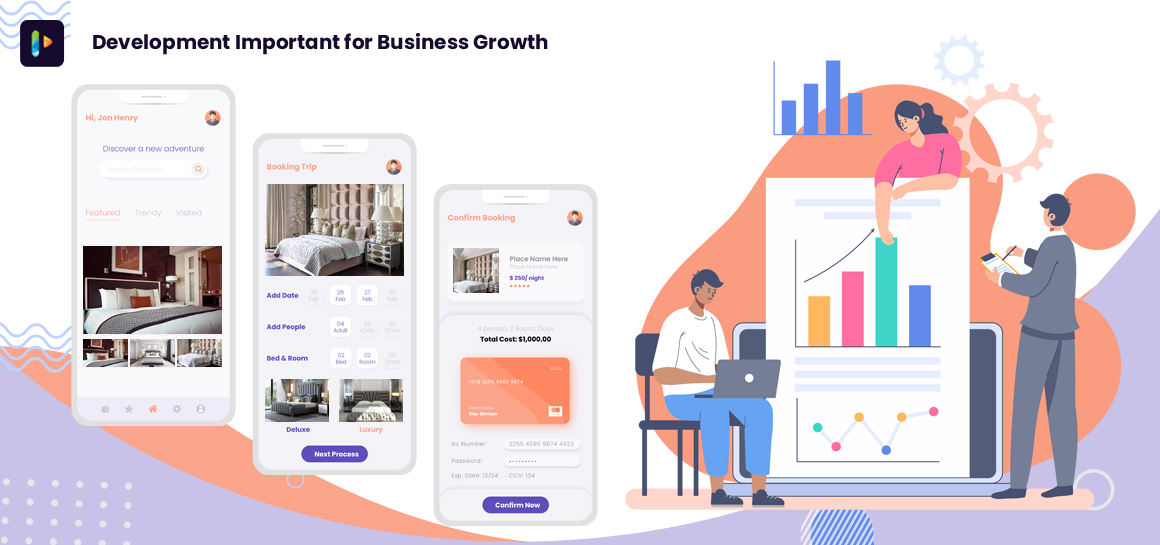
Online reservation providers aim to simplify travel and booking experience for their customers. The seamless booking process, payment, and access to a variety of options help users make a quick decision.
Here are a few stats that give a hunch about the boom in hotel and restaurant industry:
- The global online travel market size stood at US $354.2 billion in 2020. It is expected to reach US $1,835.6 billion by 2031, growing at a CAGR of 14.8% during the forecast period.
- 45% of diners prefer to dine out multiple times a week, while 20% go out to eat once a week.
- 45% of bookings for online travel agencies take place through smartphones.
This whopping expansion is emerging as an incredible opportunity for app developers to collaborate with their clientele. From start-ups to tech entrepreneurs and hotel establishments, everyone is moving toward hotel booking app development for feasible, secure, and affordable solutions.
How to Develop a Hotel and Restaurant Booking App?
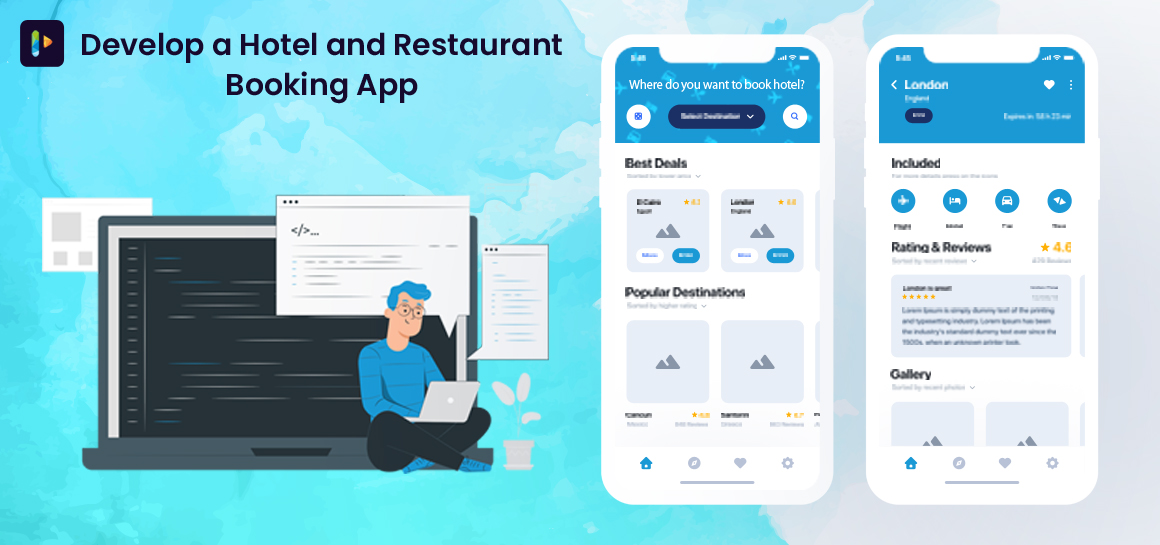
When you’re ready to start with your project, it is imperative to find the best restaurant and hotel booking app development company and make sure their services align with your goals. The right development partner will be able to apply their expertise and experience into creating the outcome you’ve envisioned.
Moreover, the hotel booking app developers will help you craft an elaborate plan that effectively encompasses every potential variable. You will also need to make sure that your app generates a good revenue flow while unveiling an innovative solution in the market.
Now let’s take a look at the steps to develop a hotel and restaurant booking app:
1. Perform Market Research
Take any app development process, it starts with proper market research. This stage is crucial for many reasons. While researching, you will get to identify some major competitors in the industry.
You must understand the services they are offering and determine how you can stand out. Your research should also cover the most popular features and top technology trends other market players are adopting. Observing everything will help you come up with a plan to have a competitive advantage.
2. Define Your Plan
Before you begin with the development process, it is imperative to define and ideate your hotel and restaurant booking app plan. At this stage, you should be able to detail the project information clearly. It involves every major and minimal aspect of the development.
With proper analysis, you can gather tech stack requirements and plan project specifications in a detailed manner. Moreover, designers can create wireframes for each app screen. With the help of detailed information, you will also be able to make a final project estimate.
3. UI/UX Design
Once the plan is finalized, your team of designers can carry out the UI/UX design process for the app. The wireframes created in the planning stage will help your designers to create mockups for your restaurant and hotel booking app.
Creating an outstanding design for the app requires wireframes, understanding of project requirements, and market trends. It will help designers create an app prototype that aligns with your business goals. After this part is complete, designers can forward the project to developers and collaborate with them for further process.
4. Start with the Development Process
This is an integral phase in the process where actual hotel booking app development begins. At this stage, your entire plan including design, and tech stack, comes to execution. This is the time when the expertise and experience of your app development team will prove to be most useful.
The best way to carry out the development stage smoothly is to set milestones. It will help you analyze the pace and quality of work by the app developers. Every task involved in this phase is critical and the success of your app depends a lot on it. Therefore, it is recommended to not rush the process and track every step.
5. Perform Quality Assurance
Quality Assurance or QA is yet another crucial phase in hotel booking app development. During this stage, QA specialists perform multiple tests to confirm that the software is free from bugs and meets all requirements.
After the completion of tests, QA specialists input remarks into bug reports and share them with developers. Bug reports display the status of the app’s performance and show the functions where the problem occurred. These reports enable developers to find and fix the bug.
6. Launch Your App
The testing phase makes sure that the app is ready in terms of functions and overall performance. After that, the development team performs the final inspection to confirm that the hotel booking app functions as required and is ready for launch.
Once the final finish is complete, you can launch your hotel and restaurant app for the target market. The initial release will come with feedback and reviews. You can use them to commence required changes or improvements.
7. App Maintenance
With ever-evolving market trends and customer preferences, maintaining an app becomes a necessity. App maintenance and updates is a routine task which is essential to accomplish for meeting demands.
Most app development companies include app maintenance in their hotel and restaurant booking app development services. This allows you to have the same team to support your app by implementing necessary updates and new features.
Note, these steps indicate different phases a restaurant and hotel app development undergoes. Planning the project with experts and engineers will help you formulate the overall process and steps.
Technology Stack for the Hotel and Restaurant Booking App Development
- For access to data in real-time: Kafka software
- Real-time Analytics: Cisco, IBM, BigData, Apache Flink, Spark, Hadoop
- Storage and caching in CDNs: Amazon S3
- Desktop-based UI: Chromium Embedded Framework (CEF)
- Cloud Environment: AWS
- SMS, Phone, and Voice: Twilio, Nexmo
- Emails: Mandrill
- Notifications: Twilio, Push.io
- Payments: PayPal, eWallets, Braintree, Stripe
- HTTP & Proxy Server: Nginx
- Primary Platform Structure: Google Cloud Platforms
- Maps: Google maps API
- Nearby destinations: Google places API
- Streaming Media System: Nimble Streamer, Wowza Streaming Engine, Helix Universal Server
Restaurant and Hotel Booking App Development Cost
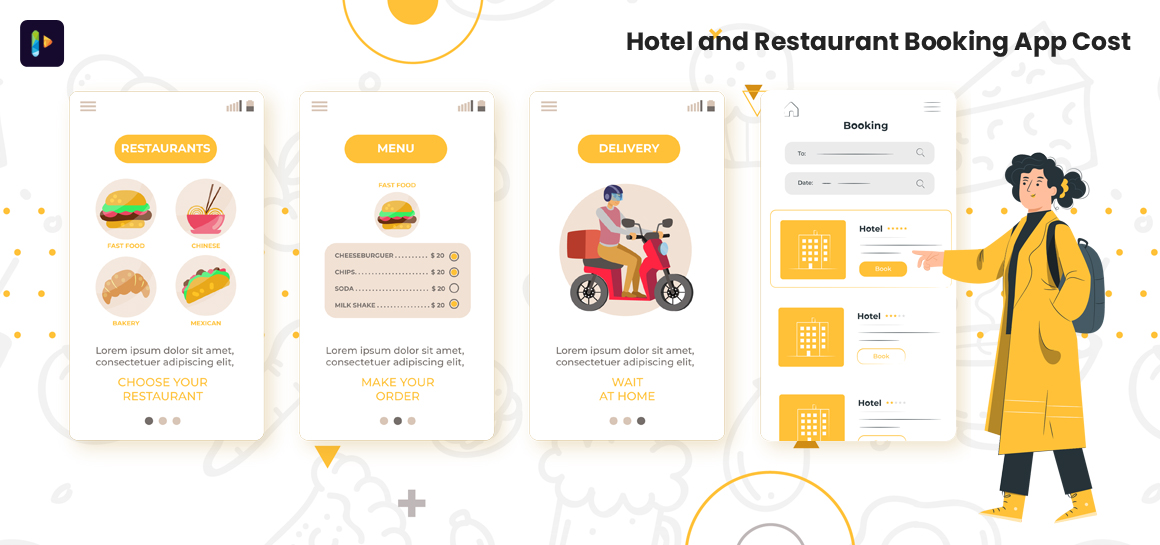
There are many factors determining the overall restaurant and hotel booking app development cost. Let’s take a look:
- Product features and functionality
- Product UI/UX
- Development team
- Number of app developers working on the project
- Size of project
- Complexity level of project
- Technology stack
- Time spent in the overall development process
Apart from that, the location of app developers significantly affects the cost of restaurant and hotel booking app development. While hotel app developers in the US charge between $100 – $240 per hour, the cost in India ranges from $20 to $40 per hour.
Conclusion:-
Digital transformation has emerged as an excellent and a far more feasible way to communicate. Businesses have a lot to gain from the convenience digital technologies provide. There’s no denying the fact that the restaurant, travel and hospitality industry is making the best out of it.

